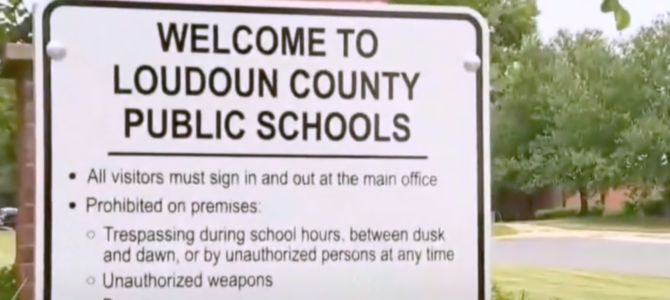
In a victory for free speech and academic freedom, a judge just ruled that Loudoun County teacher Byron “Tanner” Cross must be reinstated to his job.
Cross made national headlines after he slammed proposals that would bring transgender medical treatments into local Virginia schools and would force teachers to use students’ chosen pronouns, regardless of their biological sex. Cross said he wouldn’t use transgender students’ chosen pronouns, since they’re inconsistent with the biological sexes of the children.
Citing his deeply held religious beliefs, the elementary school physical education teacher said he believes the proposed transgender policies are both child abuse and sinful: “I’m a teacher, but I serve God first. I will not affirm that a biological boy can be a girl and vice versa, because it’s against my religion. … It’s lying to a child, it’s abuse to a child, and it’s sinning against our God.”
Cross voiced his concerns during the public comment period of a Virginia school board meeting. He clarified that he loves the children he teaches, but he will not lie to them: “I love all of my students, but I will never lie to them regardless of [the] consequences.” Cross was promptly suspended and prohibited from visiting school property.
With the help of the Alliance Defending Freedom, Cross fought back by suing the school board. Last week, he filed a lawsuit, arguing that the school board is penalizing him for engaging in his First Amendment rights. As plaintiff, Cross said the following:
“Plaintiff first contends that his suspension was an act of retaliation following his exercise of his rights to free speech in that, 1) his speech was constitutionally protected, 2) the Defendants’ retaliatory action adversely affected the Plaintiff’s constitutionally protected speech, and 3) there was a causal relationship between the speech and the action.”
While the suit continues to be litigated in court, Cross was temporarily vindicated when Judge James E. Plowman Jr. granted injunction, holding that Cross’s religious liberty and free speech rights are integral to the case and that Cross’s criticisms are protected by the First Amendment. Cross was “speaking as a citizen” on a matter “that can only be described as a ‘matter of public concern.’”
An attorney for the school system argued that the principal needed to remove Cross because of backlash from parents, five of whom asked the school to remove their children from Cross’s classroom within 48 hours. The defendant has also alleged that Cross disrupted and adversely affected the school’s environment.
At a rally on Friday, Cross defended his speech: “Last Tuesday, I went to [a] school board meeting and respectfully objected to two proposed policies. When I spoke, I was thinking about my values, my students, my parents, and my fellow teachers.” Cross continued, “The truth is I’m not alone. Many of us are concerned that [the] proposed policies would harm students and require us to violate our beliefs by saying things that are not true.”
In response to Tuesday’s injunction, Alliance Defending Freedom President and CEO Michael Farris celebrated the court’s holding, saying, “Nobody should be punished for expressing concern about a proposed government policy, especially when the government invites comment on that policy. For that reason, we are pleased at the court’s decision to halt Loudoun County Public Schools’ retaliation against Tanner Cross while his lawsuit continues.”
Farris emphasized that educators should not lose their jobs because they dare to express themselves:
Educators are just like everybody else — they have ideas and opinions that they should be free to express. Advocating for solutions they believe in should not cost them their jobs. School officials singled out his speech, offered in his private capacity at a public meeting, as ‘disruptive’ and then suspended him for speaking his mind. That’s neither legal nor constitutional. Dozens of other teachers have shared their beliefs on various policies without retaliation; Tanner deserves to be treated with the same respect.
While Tuesday’s decision enables Cross to resume his job, it makes clear that the policies themselves remain up for debate. “[Today’s] Opinion makes no finding with respect to the constitutionality or merits of the underlying [transgender] policies,” it noted. “The content of such policies are the decision of the legislative branches of government and are not currently before the Court for review.”
The decision also emphasizes concerns that the school board’s behavior toward Cross has already chilled protected speech. “In assessing whether similarly situat[ed] persons would be chilled by the government conduct, the Plaintiffs offer five Declarations from LCPS staff employees, who each declare that they wish to make public comment regarding the same issues that Plaintiff spoke, but due to the actions of LCPS in suspending Plaintiff for his speech, they are afraid to speak publicly for fear of similar retaliation,” is said. In other words, the school board’s negative response toward Cross dissuades others from speaking up.
Not only was Cross suspended for participating in a public event, but he was penalized with more than employment suspension, including the school board restricting him from school property. Cross was also restricted from future dialogue at public comment sessions:
Plaintiff points out that this language went beyond an ordinary employment suspension and additionally restricted his ability to have future public dialog[ue] with the School Board at public comment sessions. Despite the Defendant[’]s contention that a mechanism was in place to allow him access to LCPS property, that access was not absolute and rested on the subjective determination of his supervisor.
Cross is vindicated for now, but the case awaits trial in the coming weeks.








